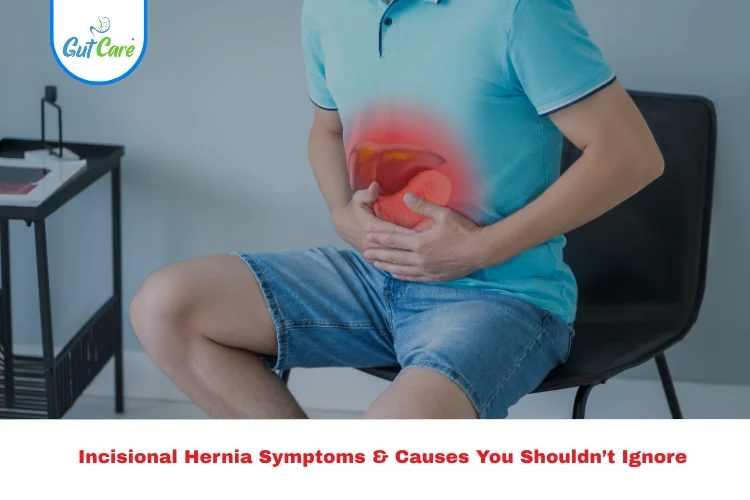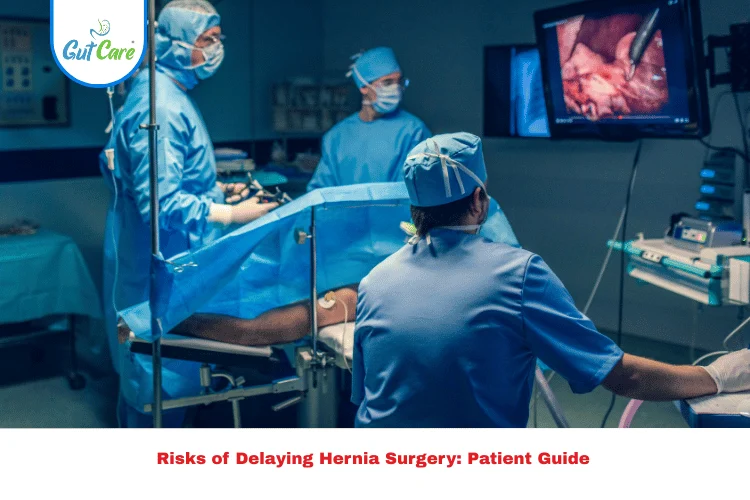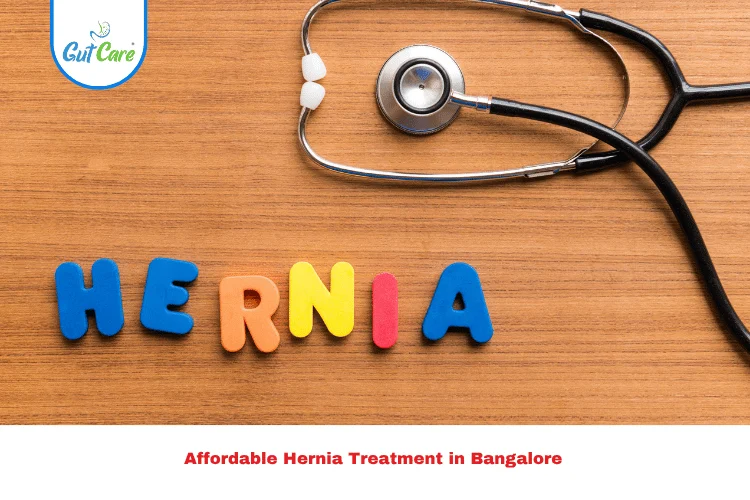In case you have had abdominal surgery recently and are now seeing abnormal swelling, pain, or discomfort at the site of injury, it is likely that you are facing incisional hernia symptoms. At Gutcare Clinics in Bangalore, we are regularly visited by patients who are in confusion as they mistake the signs of incisional hernia for the normal post-surgical recovery symptoms. On the other hand, being aware of the correct symptoms and their sources can enable you to get immediate treatment and prevent further problems.
What is an Incisional Hernia?
An incisional hernia occurs when part of the intestine or fatty tissue pushes through a weakened spot in the abdominal wall at or near the site of a previous surgical incision. It’s a type of ventral hernia that usually develops within months of surgery but can appear years later.
Common Incisional Hernia Symptoms
Spotting the warning signs early can make a big difference in treatment success. Here are the most common incisional hernia symptoms:
1. Obvious Bulge at the Surgical Site
You will see a soft bulge or lump, especially when you are standing or coughing. This bulge may lay flat when you lay down.
2. Pain or Discomfort Around the Incision
You may feel mild to severe pain that increases with your activity level. These could be due to activities such as lifting, bending, or prolonged standing.
3. Heaviness or Pressure
You may feel dragging in your abdomen that is worse.
4. Digestion Problems
Occasionally, to the involvement of the intestines, patients will experience nausea, constipation, or trouble passing stool.
5. Changes in Skin
If you notice redness, warmth, or tenderness over the bulge you may have inflammation or infection – you should seek medical treatment urgently.
What Causes an Incisional Hernia?
Several factors can weaken the abdominal wall after surgery, leading to incisional hernia symptoms:
- Poor healing of the surgical wound – Most often from infection or not enough rest.
- Excess strain on the abdomen – Lifting heavy loads too soon after the surgery.
- Obesity – The added abdominal fat is putting pressure on healing tissue.
- Chronic coughing constipation – Constant strain on the abdomen can push tissue through weak areas.
- Multiple surgeries – Every incision increases the risk of having weak muscle walls.
Home Remedies to Support Recovery and Ease Mild Symptoms
While surgery is the definitive treatment for an incisional hernia, mild cases or those awaiting surgery can try these supportive measures at home. These remedies won’t cure the hernia but may reduce discomfort and prevent worsening.
1. Gentle Abdominal Support
- Benefit: Reduces strain on the incision site.
- How to Use: Wear a medical-grade abdominal binder as advised by your doctor.
- Precaution: Ensure it’s not too tight, as it can restrict circulation.
2. High-Fiber Diet
- Benefit: Prevents constipation, reducing abdominal pressure.
- How to Use: Eat whole grains, fresh fruits, vegetables, and legumes daily.
- Precaution: Increase fiber gradually to avoid bloating.
3. Controlled Cough and Sneeze
- Benefit: Reduces sudden strain on the abdominal wall.
- How to Use: Use your hand or a pillow to support the incision when you cough and when you sneeze.
4. .Light Physical Activity
- Benefit: Promotes circulation and healing, while not to overstrain the muscles.
- How to Use: Take a daily walk for 15-20 minutes or more.
- Caution: No lifting or twisting.
5. Maintain a Healthy Weight
- Benefit: Reduces tension at the site of the hernia, and improves surgical outcome.
- How to Use: Eat a moderate diet and follow an exercise program approved by your physician.
Summary
Incisional hernia symptoms might just be a minor bulge or very painful and accompanied by digestive issues. However, some home remedies may be of some assistance in reducing the pain but they cannot substitute the need for a doctor’s examination. In case the symptoms get aggravated, it is imperative that you seek the advice of a medical practitioner. Get in touch with Gutcare Clinics, Bangalore for an expert diagnosis and treatment that will ensure your safe recovery.
FAQs on Incisional Hernia Symptoms
1. What are the early incisional hernia symptoms ?
A little bulge at the operation site, a small amount of pain, and a feeling of discomfort when doing certain activities are some of the initial symptoms.
2. Can home remedies completely cure incisional hernia symptoms?
Definitely not. Home therapies are good for reducing pain but to have a full repair, surgery is most of the time needed.
3. Are incisional hernia symptoms always painful?
They are not necessarily so. Most of them have no pain in the beginning, but afterward, some may become painful.
4. How can Gutcare Clinics in Bangalore help with incisional hernia symptoms?
Gutcare Clinics provides specialists who can diagnose the illness with high accuracy, carry out minimal invasive surgical procedures, and draw up recovery plans that are in accordance with the patient’s needs for the successful treatment of hernias.
5. Can incisional hernia symptoms get worse if left untreated?
Indeed. There are also going to be cases where they get so far progressed as to cause conditions like incarceration or strangulation, which call for emergency




